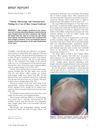 1 citations,
April 2021 in “Plant Archives/Plant archives”
1 citations,
April 2021 in “Plant Archives/Plant archives” Onions may help reduce cancer risk and obesity-related issues.
1 citations,
September 2018 in “International journal of research - granthaalayah” Human hair medulla doesn't break down hydrogen peroxide, which may affect hair color formation.
[object Object]  28 citations,
January 2017 in “Critical Reviews in Therapeutic Drug Carrier Systems”
28 citations,
January 2017 in “Critical Reviews in Therapeutic Drug Carrier Systems” Nanomaterials in biomedicine can improve treatments but may have risks like toxicity, needing more safety research.
 20 citations,
November 2019 in “International Journal of Environmental Research and Public Health”
20 citations,
November 2019 in “International Journal of Environmental Research and Public Health” Breathing in high levels of certain air pollutants significantly increases women's risk of developing Polycystic Ovary Syndrome.
May 2024 in “Molecules/Molecules online/Molecules annual” Plant extracts can help prevent hair loss and promote hair growth.
November 2020 in “IntechOpen eBooks” Not getting enough minerals can lead to health problems and shorter lifespans.
 May 2024 in “Biochemical pharmacology”
May 2024 in “Biochemical pharmacology” Blocking CISD1 reduces hearing loss from cisplatin in mice.
 December 2023 in “International Journal of Science and Research (IJSR)”
December 2023 in “International Journal of Science and Research (IJSR)” Herbal treatments are effective and preferred for hair loss with fewer side effects.
 11 citations,
March 2009 in “Bioorganic & Medicinal Chemistry Letters”
11 citations,
March 2009 in “Bioorganic & Medicinal Chemistry Letters” Chemicals called 4-(alkylthio)- and 4-(arylthio)-benzonitrile derivatives can potentially reduce oil production on skin, which could help treat conditions like acne and hair loss.
 7 citations,
January 2015 in “Hair therapy & transplantation”
7 citations,
January 2015 in “Hair therapy & transplantation” Air pollution can cause hair loss, and using antioxidants, special shampoos, and coconut oil can improve scalp health and hair density.
 4 citations,
May 2017 in “Pediatric Dermatology”
4 citations,
May 2017 in “Pediatric Dermatology” The study found that Short Anagen Syndrome results in short hair growth not due to hair fragility, and hair may grow longer after puberty.
 1 citations,
August 2023 in “Cutis”
1 citations,
August 2023 in “Cutis” Low ferritin levels can indicate iron deficiency as a cause of hair loss.
 February 1938 in “Journal of the American Medical Association”
February 1938 in “Journal of the American Medical Association” Washing can prevent cancer from lubricating oils, extreme body temperatures need more study, Sulfomid is not recognized, no reliable diphtheria carrier treatment except surgery, eyelid injuries should heal before repair, heterophile antibody test is specific for mononucleosis, chlorine inhalations for colds are outdated, and wheat germ is safe.
 138 citations,
November 2015 in “Journal of Pharmacology and Experimental Therapeutics”
138 citations,
November 2015 in “Journal of Pharmacology and Experimental Therapeutics” Protoporphyrin IX is useful in cancer treatment but can cause health problems if not properly regulated.
[object Object]  53 citations,
February 2020 in “Expert Opinion on Pharmacotherapy”
53 citations,
February 2020 in “Expert Opinion on Pharmacotherapy” Finasteride and minoxidil work best together for hair loss.
 23 citations,
August 2019 in “Proceedings of the National Academy of Sciences of the United States of America”
23 citations,
August 2019 in “Proceedings of the National Academy of Sciences of the United States of America” Pollution exposure speeds up hair damage.
 16 citations,
October 2015 in “Photochemistry and photobiology”
16 citations,
October 2015 in “Photochemistry and photobiology” Reducing copper (II) ion levels in hair can decrease hair damage.
 15 citations,
November 2015 in “Trends in biotechnology”
15 citations,
November 2015 in “Trends in biotechnology” Gene regulation could revolutionize hair color by altering pigmentation from within.
 10 citations,
July 2011 in “Springer eBooks”
10 citations,
July 2011 in “Springer eBooks” Carboxytherapy can improve skin conditions with few side effects, but results may vary and are not guaranteed.
 1 citations,
May 2017 in “Asian journal of medical sciences”
1 citations,
May 2017 in “Asian journal of medical sciences” The dietary supplement significantly improved skin, nails, and hair in older adults.
 1 citations,
January 2010 in “Springer eBooks”
1 citations,
January 2010 in “Springer eBooks” Certain micronutrients may improve hair and nail health, but more research is needed to confirm their benefits.
 January 2020 in “Cosmetics”
January 2020 in “Cosmetics” Ecklonia cava extract may protect the scalp from pollution and improve its health.
 April 2018 in “Assiut Veterinary Medical Journal/Maǧallaẗ Asyūṭ al-ṭibiyyaẗ al-baytariyyaẗ”
April 2018 in “Assiut Veterinary Medical Journal/Maǧallaẗ Asyūṭ al-ṭibiyyaẗ al-baytariyyaẗ” Zinc levels in body fluids can help diagnose zinc deficiency in lambs, with fecal zinc as an early indicator.
 239 citations,
July 2002 in “Clinical and Experimental Dermatology”
239 citations,
July 2002 in “Clinical and Experimental Dermatology” Low iron and L-lysine levels can cause hair loss in women, and increasing these nutrients can reduce hair shedding.
 136 citations,
May 2016 in “Phytotherapy Research”
136 citations,
May 2016 in “Phytotherapy Research” Turmeric may have benefits for skin health, but more research is needed to confirm its effectiveness.
 116 citations,
December 2017 in “International Journal of Women's Dermatology”
116 citations,
December 2017 in “International Journal of Women's Dermatology” Adult female acne treatment should be personalized, considering individual preferences and pregnancy, using various topical and oral medications while managing side effects and resistance.
 96 citations,
September 2017 in “Analytica Chimica Acta”
96 citations,
September 2017 in “Analytica Chimica Acta” Hair elemental analysis could be useful for health and exposure assessment but requires more standardization and research.
 95 citations,
April 2013 in “PLOS ONE”
95 citations,
April 2013 in “PLOS ONE” Ginseng is possibly safe but its effectiveness is unclear due to poor quality studies and mixed results.
 78 citations,
February 2011 in “Canadian Medical Association Journal”
78 citations,
February 2011 in “Canadian Medical Association Journal” Acne treatment varies, with topical and systemic therapies effective, and more research needed on treatment order and long-term effects.
 73 citations,
April 1999 in “Dermatologic Clinics”
73 citations,
April 1999 in “Dermatologic Clinics” Lasers and light sources can effectively remove hair, work best on fair skin with dark hair, and usually need multiple treatments.



























